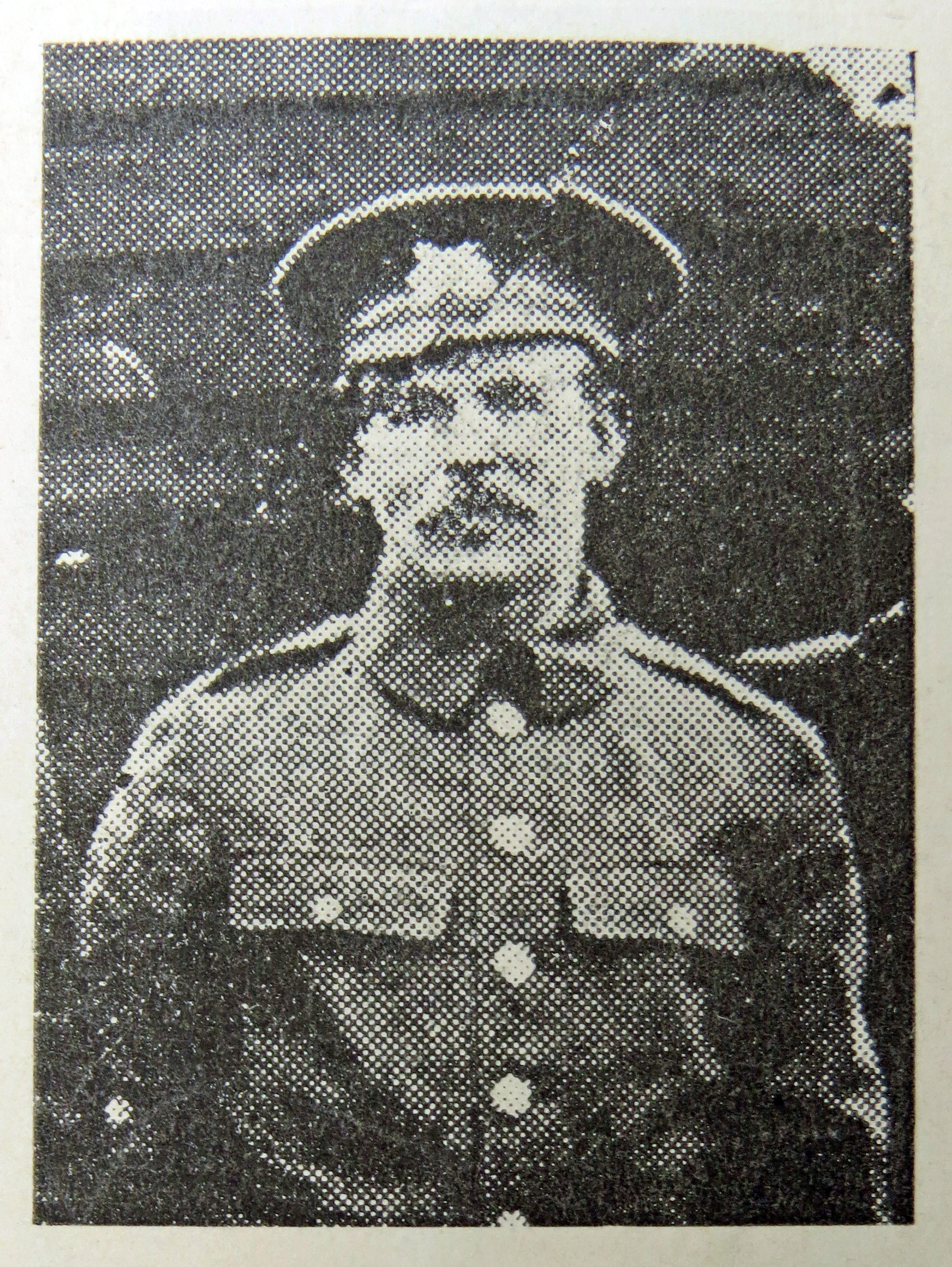Pte
Oliver Watson Bramley
Informations sur naissance
|
Date de naissance: 07/10/1882 |
|
Lieu de naissance: Whitley, Yorkshire, Angleterre, Royaume-Uni |
Informations générales
|
Profession: ouvrier journalier |
Informations service militaire
|
Pays: Angleterre, Royaume-Uni |
|
Force armée: British Expeditionary Force |
|
Rang: Private |
|
Numéro de service: 245438 |
|
Incorporation nom de lieu: Harrogate, Yorkshire, Angleterre, Royaume-Uni |
|
Unités: — Manchester Regiment, 20th Bn. (Dernière unité connue) |
Informations sur décès
|
Date de décès: 10/10/1917 |
|
Lieu de décès: Noordemdhoek, Belgique |
|
Cause du décès: Killed in action (K.I.A.) |
|
Âge: 35 |
Mémorial
|
Tyne Cot Memorial Panneau: 121 |
Distinctions et médailles 2
|
British War Medal Médaille — 08/01/1920 |
|
Victory Medal Médaille — 08/01/1920 |
Points d'intérêt 2
| #1 | Lieu de naissance | ||
| #2 | Lieu d'enrôlement |
Mon histoire
Private Oliver Watson Bramley served in the 20th Battalion Manchester Regiment, part of the 22nd Brigade, of the 7th Division. On the 9th of October 1917 the Division participated in the Battle of Poelcappelle, a stage of the Third Battle of Ypres.
On Sunday 7 October 1917 the 20th Manchesters were brought up to the frontline near the hamlet of Noordemdhoek, east of Polygon Wood, with Battalion Headquarters in a nearby Pill-box. In the early hours of 9 October 1917 the 22nd Brigade attacked at 5.20am with the 2nd Artillery Company and the 2nd Royal Warwickshires, the 9th Devons were in reserve.
The 20th Manchesters were on the left flank of the divisional front, in the sector of the 20th Brigade. They were holding the line in support of the 22nd Brigade which had to advance towards Judge Copse and the hamlet of Reutel. The 2nd Artillery Company, on the right of the divisional front, quickly took the hamlet of Reutel and cleared part of the Reutel Cemetery, east of the hamlet. However they were eventually held at Juniper Cottage by heavy machine gun fire.
At 5.20 a.m. patrols were sent out to see whether the Battalion’s position could be improved. This was the case and the line was advanced, which gave the Battalion a field of fire of three miles on the 20th Manchesters’ front. Throughout the day the Battalion was frequently shelled by the German artillery and in consequence of the British barrage the German artillery replied with an intense barrage on the Battalion’s Headquarters. During the day two Platoons from the 20th Manchesters’ “B” Company were sent to fill a gap which had occurred between the two frontline Companies.
While the 20th Manchesters held their ground on the left flank, the Warwickshires were able to pass through Judge Copse, during the afternoon. But they failed to mop up the Copse and their attack was checked. Fighting continued till dusk, when Judge Copse eventually fell to the Devons and all gains were secured.
Private Oliver Watson Bramley was killed in action on the 9th of October 1917. He possibly fell due to German shelling while holding the line at Noordemdhoek. He has no known grave and is remembered at the Tyne Cot Memorial.
On Sunday 7 October 1917 the 20th Manchesters were brought up to the frontline near the hamlet of Noordemdhoek, east of Polygon Wood, with Battalion Headquarters in a nearby Pill-box. In the early hours of 9 October 1917 the 22nd Brigade attacked at 5.20am with the 2nd Artillery Company and the 2nd Royal Warwickshires, the 9th Devons were in reserve.
The 20th Manchesters were on the left flank of the divisional front, in the sector of the 20th Brigade. They were holding the line in support of the 22nd Brigade which had to advance towards Judge Copse and the hamlet of Reutel. The 2nd Artillery Company, on the right of the divisional front, quickly took the hamlet of Reutel and cleared part of the Reutel Cemetery, east of the hamlet. However they were eventually held at Juniper Cottage by heavy machine gun fire.
At 5.20 a.m. patrols were sent out to see whether the Battalion’s position could be improved. This was the case and the line was advanced, which gave the Battalion a field of fire of three miles on the 20th Manchesters’ front. Throughout the day the Battalion was frequently shelled by the German artillery and in consequence of the British barrage the German artillery replied with an intense barrage on the Battalion’s Headquarters. During the day two Platoons from the 20th Manchesters’ “B” Company were sent to fill a gap which had occurred between the two frontline Companies.
While the 20th Manchesters held their ground on the left flank, the Warwickshires were able to pass through Judge Copse, during the afternoon. But they failed to mop up the Copse and their attack was checked. Fighting continued till dusk, when Judge Copse eventually fell to the Devons and all gains were secured.
Private Oliver Watson Bramley was killed in action on the 9th of October 1917. He possibly fell due to German shelling while holding the line at Noordemdhoek. He has no known grave and is remembered at the Tyne Cot Memorial.
Sources 3
|
20 Battalion Manchester Regiment, (The National Archives, KEW (TNA), WO 95/1663/1). https://discovery.nationalarchives.gov.uk/details/r/C14303 Autre référence |
|
McCarthy C., Passchendaele. The Day-by-Day Account, (London, Uniform, 2018), pg. 118-119. Sources utilisées |
|
Stedman M., Manchester Pals 16th, 17th, 18th, 19th, 20th, 21st, 22nd + 23rd Battalions of Manchester Regiment: A History of the Two Manchester Brigades, (London, Leo Cooper, 1994), pg. 178-180. Sources utilisées |
Complément d’informations 3
|
Commonwealth War Graves Commission Database https://www.cwgc.org/find-records/find-war-dead/casualty-details/842755 |
|
Namenlijst (In Flanders Fields Museum) https://namenlijst.org/publicsearch/#/person/_id=b86fec1e-7d8c-4f4b-acc8-05c291cfa7f4 |
|
Lives of the First World War (Imperial War Museum) https://livesofthefirstworldwar.iwm.org.uk/lifestory/470588 |
